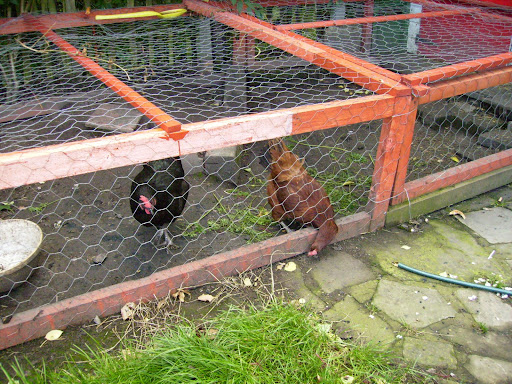 Defra have confirmed that three wild mute swans in Dorset died from the H5N1 strain of bird flu. As a keeper of backyard chickens, I have a keen interest in stories of bird flu in the UK. There have been a few outbreaks which have so far been contained. But the odds are that sooner or later it will become a widespread bird disease in Britain and we will have to learn to live with it.
Defra have confirmed that three wild mute swans in Dorset died from the H5N1 strain of bird flu. As a keeper of backyard chickens, I have a keen interest in stories of bird flu in the UK. There have been a few outbreaks which have so far been contained. But the odds are that sooner or later it will become a widespread bird disease in Britain and we will have to learn to live with it.I'm not too worried. From my experience with beekeeping I know that we can learn to manage animal disease. The bee parasite varroa destructor came to Britain in 1992, and you can pretty much say that every bee colony in the country is now infected. But all British beekeepers now know how to monitor and control the mite to minimise the damage it does.
Of course varroa causes no harm to humans, but H5N1 bird flu has infected several hundred people worldwide since 2003, and killed almost 2/3 of them. All those infected have caught the disease from close contact with infected birds, but it mutates very quickly and scientists fear that it could mutate to a form that passes easily from human to human.
All UK poultry keepers, even people like me who only have a couple of backyard chickens, should be ready to confine them indoors if necessary, somewhere the birds can live humanely for as long as need be, out of all contact from wild birds. My chickens have a palatial coop with checky red curtains and it would be no trouble to keep the door to the run permanently shut if bird flu was detected in our area. If that ever happened, I would stop the kids from having contact with the chickens, and I would take additional hygeine precautions myself when feeding the chickens, cleaning their coop and collecting eggs. If need be I'm ready to slaughter them, or take them to be slaughtered. It would be very sad, but it might have to happen so I'm ready for it. But for now I don't need to do anything special. It's a theoretical risk, something that might happen in the future but it hasn't happened yet.
4 comments:
One of the things they do recommend is making the tops of runs "covered" rather than plain wire mesh (I assume to avoid contamination from birdies overhead and their poop)... if you're worried it might be worth considering
It's also keep the chicken run drier, which would be a lot less squishy and allow the hens to dust-bathe even in the lousy weather we've had recently.
If you ran the roof gutter into a bowl up one end they could still have access to water for a splash.
But if you did that any infected bird poop on the roof would be washed into the bowl, thus negating the anti-contamination measure. Anyway, little wild birds such as sparrows and tits pop into our chicken coop through the mesh on the sides of the runs. I could enclose the run completely, but then they'd be back indoors... I think having the option to feel the sun on your back and the breeze in your feathers is part of being a pampered free-range chicken, and I won't enclose any part of their run until I have to.
Ours are still out and about here in Ireland. I don't let the kids pick them up anymore though. Podchef wrote a good post on the Sallygardens forum about H5N1 here http://sallygardens.freeforums.org/viewtopic.php?t=36
Post a Comment